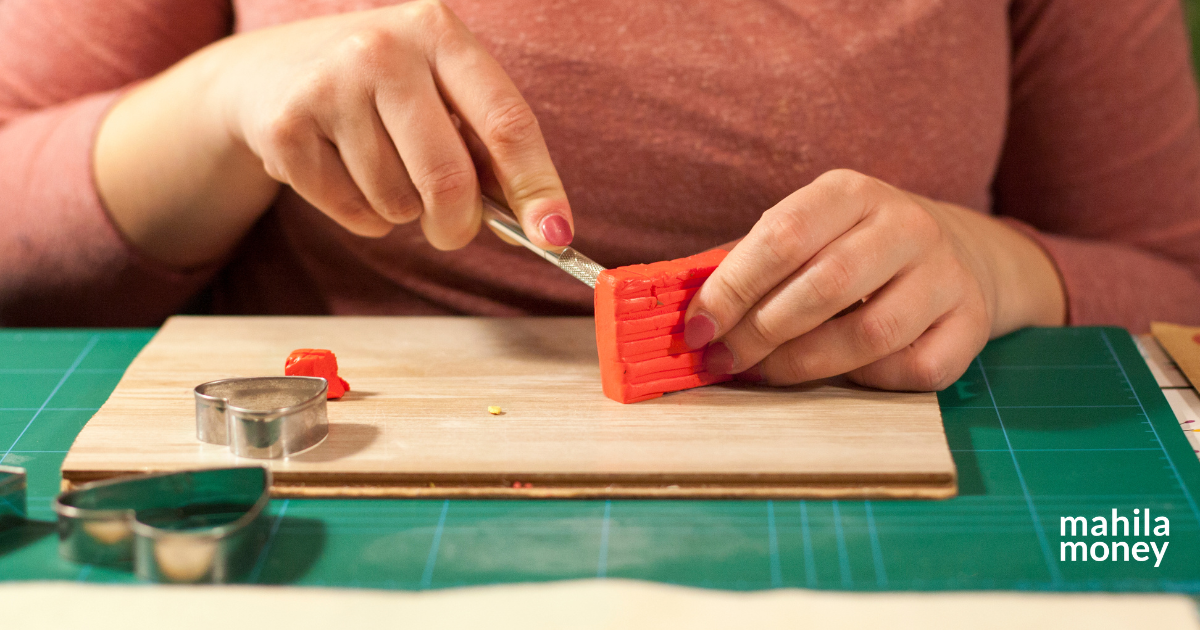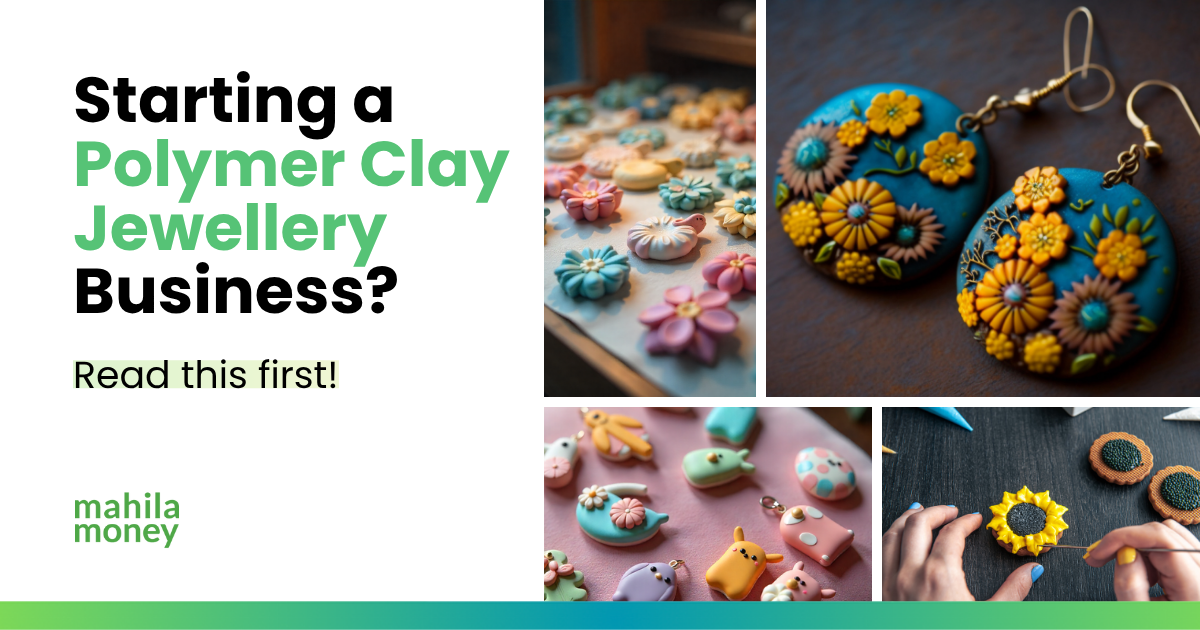The demand for handmade jewellery in India is growing. According to a recent report, the artificial jewellery market in India is expected to reach ₹650 billion by 2028. Today’s customers are seeking something unique, personal, and handcrafted, and that’s what polymer clay jewellery offers.
At the same time, an increasing number of women are starting their businesses from home. A recent report by EdelGive Foundation found that women now run 20% of all Indian businesses, and this number is expected to rise to 33% by 2030. Many of these women are starting small- making jewellery, food products, or handmade crafts from their homes.
If you’re a woman looking to start a business from home, polymer clay jewellery is a great option:
- You don’t need a big investment (you can start under ₹10,000)
- You can work at your own pace and time
- The product is trendy and easy to sell online.
Whether you’re a college student, homemaker, or someone looking for a creative side hustle, here are 5 important things you need to know before starting your own polymer clay jewellery business in India.
5 Things You Must Know Before Starting a Polymer Clay Jewellery Business
1. Understand What Polymer Clay Is and Why It’s Perfect for Home-Based Jewellery Making
Polymer clay is an oven-bake synthetic modelling clay used to create detailed, colourful accessories. Unlike traditional clay, it doesn’t dry in the air and needs to be baked in an oven. Once baked, it becomes lightweight, durable, and water-resistant, making it ideal for jewellery such as earrings, rings, necklaces, and even festive collections.
In India, polymer clay is available under international brand names such as FIMO, Sculpey and Cernit.
Locally, people often search for:
- DIY clay for jewellery
- oven-bake clay India
- synthetic jewellery clay
- baking clay for earrings
Polymer clay is available on websites like Amazon, Itsy Bitsy, and Meesho. These are excellent choices for someone who want to experiment with the material before making a bigger investment because they frequently include starter kits.
2. What You Need to Start a Polymer Clay Jewellery Business from Home
Starting a polymer clay jewellery business from home in India requires minimal space and equipment. One can start from a desk or dining table corner, making it ideal for women juggling home and business responsibilities.
Here’s a breakdown of what you need:
- Polymer clay blocks (start with 5–10 colours)
- Acrylic roller or glass bottle for flattening
- Clay cutters or cookie cutters for shaping
- X-Acto knife or craft blade
- Baking surface (like a ceramic tile or baking tray)
- Oven (OTG works best) to cure the clay
- Sandpaper or nail buffer to smooth rough edges
- Jewellery findings like hooks, jump rings, and glue
- Optional: Varnish or resin for a glossy finish
Initial investment: ₹5,000–₹10,000, depending on brands and tools chosen. Use a well-ventilated area for baking, and keep separate tools for your polymer clay jewellery business, distinct from your regular kitchen utensils.
3. Legal Basics: Registration, GST & Bank Accounts
Even if you’re starting small, it’s important to treat your polymer clay jewellery business like a real business. This helps build credibility and prepares you to scale when needed.
Here’s what you should know:
- MSME Registration (Udyam): Recommended if you’re applying for business loans later to scale your business. Here’s how to apply for MSME registration online.
- Separate Bank Account: Keeps personal and business finances separated.
- GST Registration: Optional if the annual revenue is below ₹20 lakh. However, it is mandatory to sell through platforms such as Amazon, Flipkart, and your own website.
- Bookkeeping: Maintain digital records of sales, expenses, and inventory. Utilise free tools such as Vyapar, Google Sheets, or KhataBook.
Having these basics in place also increases your chances of securing a small business loan.
4. Pricing, Profit Margins & Cost Management
One of the key mistakes new business owners make is underpricing their products. Handmade items, including polymer clay jewellery, hold emotional and artistic value and should be priced accordingly. Knowing how to price your products will help you in building a profitable business.
To price your products:
- Calculate the material cost per piece
- Add your hourly labour (start with ₹100–₹150/hour)
- Factor in platform fees, packaging, and logistics
- Consider design complexity, don’t price all items the same
Let’s say you create a pair of earrings:
- Clay + accessories = ₹30
- Time spent (30 mins) = ₹75
- Packaging = ₹10
- Shipping (if applicable) = ₹50
Total cost = ₹165. Selling price should be at least ₹300-₹350. That’s a profit margin of over 50%, which is a sustainable level.
Use bundle pricing or festive combos to attract buyers, especially during Rakhi, Diwali, or wedding seasons.
5. Selling Your Polymer Clay Jewellery: Online Platforms & Marketing Tips
Selling your polymer clay jewellery is now easier than you think. All thanks to digital platforms like Instagram and Whatsapp. But keep in mind that maintaining visibility for your polymer clay business is just as important as producing jewellery.
Where to sell polymer clay jewellery online in India:
- Instagram Shops – Post reels, use trending hashtags like #handmadeinIndia, #polymerclayearrings
- Meesho – Great for budget buyers
- Etsy India – For international customers
- Amazon Karigar / Amazon Handmade – Trusted, but requires GST
- WhatsApp Business – Share catalogues and get direct orders
Marketing tips:
- Use natural light to click product photos
- Shoot behind-the-scenes videos: making clay, baking, packaging
- Share customer testimonials and feedback
- Collaborate with micro-influencers or local boutiques
- Use trending themes—festive motifs, regional patterns, bridal sets
You can also run basic Facebook/Instagram ads to reach more people in your city or state for for your online jewellery business. . Budget: ₹300–₹500 per ad to begin.

Why Polymer Clay Jewellery Business
For starting a polymer clay jewellery business from home, you don’t need a big budget or an office space. With the right tools, a bit of practice, and some business sense, you can build a brand that’s personal, profitable, and future-ready.
For many women entreprneur, this business isn’t just about jewellery, it’s about having their own income, making time for themselves, and learning the ropes of entrepreneurship.
If you’re ready to begin, Mahila Money is here to support you with business loans, learning resources, and a community of women just like you.
Apply For a Business Loan
Pro Tips: For First-Time Polymer Clay Jewellery Entrepreneurs
1. Start With One Niche Style Before Exploring Trends: Don’t try to do everything; begin with one style (e.g., minimal studs, floral danglers, or traditional motifs) and build your confidence before expanding.
2. Use Instagram Polls to Ideate: Scroll through, watch what people are buying- what colours, shapes, or styles they want. It will help you build your next best-seller.
3. Save Clay Scraps, They’re Your Practice Gold: Leftover bits from trimming or failed pieces can be reused for test baking, mixing custom colours, or hidden base layers.
4. Avoid Glossy Finishes on All Products: While varnish looks good in photos, some buyers prefer matte or natural finishes. Offer both versions, especially if selling to conscious buyers.
5. Create a “No-Bake” Day for Content & Planning: Block 1 day a week to focus on photography, pricing, inventory, or social media. It helps avoid unnecessary burnout and grows your business steadily.
6. Practice Small Batch Production Early On: Instead of making pieces one by one, try batching, rolling, cutting, and baking 5–10 pieces at once. Saves time, especially during festive seasons.
7. Invest in Good Packaging Early; it Sells Trust: Even if your jewellery is handmade, your packaging should feel premium. A ₹5 thank-you card, a cotton pouch, or simple branding can go a long way.
FAQs: Starting a Polymer Clay Jewellery Business from Home
1. Is polymer clay available in India, and where can I buy it?
Yes, polymer clay is available in India through online stores like Amazon, Itsy Bitsy, Hobby Ideas, and craft suppliers on Instagram. Popular brands include FIMO, Sculpey, and Cernit. You can start with basic colour packs and later move to custom tools and accessories.
2. Can I use a microwave to bake polymer clay?
No, polymer clay cannot be baked in a microwave; it must be cured in a regular OTG oven. Microwaving can burn or ruin the clay and may release fumes.
3. Is polymer clay safe to use at home?
Yes, polymer clay is safe to use and is non-toxic. But remember to follow some basic rules:
- Use separate tools (don’t mix with food utensils)
- Bake in a well-ventilated area
- Store clay away from direct sunlight
4. Do I need to be an artist or expert in jewellery design to start?
Not at all. Many women entrepreneurs in India begin with no prior experience. You’ll find free tutorials on YouTube, Instagram, and Pinterest to help you get started. Practice and you can develop your own style.
5. How much time does it take to make one piece of polymer clay jewellery?
It depends on the complexity. A simple pair of earrings can take 30–40 minutes, including baking time. As you improve, your speed and finishing will also get better. Bulk-making in batches also saves time.
6. How much can I earn from a polymer clay jewellery business in India?
Income depends on your pricing, designs, and consistency. Many women earn ₹10,000–₹50,000 per month within 6 months of regular sales. During festive seasons, earnings can be even higher.
7. What are the common mistakes beginners make in the polymer clay business?
- Not conditioning the clay properly before use
- Underbaking or overbaking pieces
- Using kitchen tools instead of craft tools
- Underpricing due to lack of confidence
- Skipping branding or packaging
8. Do I need to invest in expensive tools right away?
No, you can start with basics, like a rolling pin, cookie cutters, and a simple OTG. Many polymer clay businesses in India begin with homemade or affordable tools. As you grow, you can invest in professional cutters, texture sheets, and sanding machines.
Read more:
How to Start a Candle Making Business from Home in India with Just ₹5,000
How to Start a Jewellery Business Online in India: A Step-by-Step Guide for Women Entrepreneurs
How to Start Your Beauty Brand from Home: 10 Essential Steps
How to Start a Cotton Bag Manufacturing Business in India

If you are a woman entrepreneur who wants to take your business to new heights and is in need of working capital and entrepreneurship resources, come speak to us on Mahila Money. For more such #JiyoApneDumPe live conversations, download the Mahila Money App on Play Store or visit us on www.mahila.money




